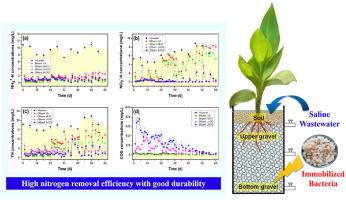当前位置:
X-MOL 学术
›
Environ. Pollut.
›
论文详情
Our official English website, www.x-mol.net, welcomes your feedback! (Note: you will need to create a separate account there.)
Improving denitrification efficiency in constructed wetlands integrated with immobilized bacteria under high saline conditions
Environmental Pollution ( IF 8.9 ) Pub Date : 2021-06-18 , DOI: 10.1016/j.envpol.2021.117592 Xinyi Wang 1 , Hui Zhu 1 , Baixing Yan 1 , Brian Shutes 2 , Gary Bañuelos 3 , Huiyang Wen 1 , Rui Cheng 1
Environmental Pollution ( IF 8.9 ) Pub Date : 2021-06-18 , DOI: 10.1016/j.envpol.2021.117592 Xinyi Wang 1 , Hui Zhu 1 , Baixing Yan 1 , Brian Shutes 2 , Gary Bañuelos 3 , Huiyang Wen 1 , Rui Cheng 1
Affiliation

|
Constructed wetlands (CWs) inoculated with exogenous microbes have great potential for removing pollutants in adverse environments. The rapid loss of functional bacteria and the high cost of repeated additions of inoculum, however, limit the practical application of this technology. In this study, C–F2 immobilized bacteria (i.e., immobilized salt-tolerant bacterium sp. F2 incorporated with a carbon source) were developed and utilized in CWs for solving the above problems. A 60-day experiment demonstrated that bioaugmented CWs (Bio-CWs) with the addition of C–F2 immobilized bacteria into the bottom gravel layer of CW microcosms (B-CF2 treatment) exhibited high nitrogen removal efficiency under a saline condition (electrical conductivity of 15 mS/cm). We measured mean nitrate nitrogen (NO-N) and total nitrogen (TN) removal percentages of 97.8% and 88.1%, respectively, which were significantly ( < 0.05) higher than those in Bio-CWs with microbial inoculum (MI-F2 treatment, 63.5% and 78.2%) and unbioaugmented CWs (CK, 48.7% and 67.2%). The TN content of the entire plant was significantly ( < 0.05) increased in B-CF2 (636.06 mg/microcosm) compared with CK (372.06 mg/microcosm). The relative abundances of the genera (i.e., the exogenous bacterium, 5.5%), (8.8%) and (21.1%) in B-CF2 were significantly ( < 0.05) higher than in MI-F2 and CK, which improved the denitrification capacity of CWs. Overall, a high denitrification efficiency and durability were achieved in the newly developed Bio-CWs (i.e., B-CF2 treatment) with immobilized bacteria under saline conditions, which provides an alternative technology for the rapid removal of nitrogen from saline wastewater.
中文翻译:

提高高盐条件下固定化细菌集成人工湿地的反硝化效率
接种外源微生物的人工湿地(CW)在去除恶劣环境中的污染物方面具有巨大潜力。然而,功能菌的快速丧失和重复添加接种物的高成本限制了该技术的实际应用。在本研究中,开发了C-F2固定化细菌(即结合碳源的固定化耐盐细菌F2)并在CW中使用来解决上述问题。一项为期 60 天的实验表明,在 CW 微观世界底部砾石层中添加 C-F2 固定化细菌(B-CF2 处理)的生物增强 CW(Bio-CW)在盐水条件下表现出高脱氮效率(电导率15 毫秒/厘米)。我们测得平均硝态氮 (NO-N) 和总氮 (TN) 去除率分别为 97.8% 和 88.1%,显着 ( < 0.05) 高于使用微生物接种的 Bio-CW(MI-F2 处理、 63.5% 和 78.2%)和未生物增强的 CW(CK,48.7% 和 67.2%)。与CK(372.06 mg/微宇宙)相比,B-CF2(636.06 mg/微宇宙)全株TN含量显着增加(<0.05)。 B-CF2中各属(即外源细菌,5.5%)、(8.8%)和(21.1%)的相对丰度显着(<0.05)高于MI-F2和CK,提高了反硝化能力化学武器。总体而言,新开发的固定化细菌Bio-CW(即B-CF2处理)在含盐条件下实现了高反硝化效率和耐久性,为含盐废水中快速脱氮提供了替代技术。
更新日期:2021-06-18
中文翻译:

提高高盐条件下固定化细菌集成人工湿地的反硝化效率
接种外源微生物的人工湿地(CW)在去除恶劣环境中的污染物方面具有巨大潜力。然而,功能菌的快速丧失和重复添加接种物的高成本限制了该技术的实际应用。在本研究中,开发了C-F2固定化细菌(即结合碳源的固定化耐盐细菌F2)并在CW中使用来解决上述问题。一项为期 60 天的实验表明,在 CW 微观世界底部砾石层中添加 C-F2 固定化细菌(B-CF2 处理)的生物增强 CW(Bio-CW)在盐水条件下表现出高脱氮效率(电导率15 毫秒/厘米)。我们测得平均硝态氮 (NO-N) 和总氮 (TN) 去除率分别为 97.8% 和 88.1%,显着 ( < 0.05) 高于使用微生物接种的 Bio-CW(MI-F2 处理、 63.5% 和 78.2%)和未生物增强的 CW(CK,48.7% 和 67.2%)。与CK(372.06 mg/微宇宙)相比,B-CF2(636.06 mg/微宇宙)全株TN含量显着增加(<0.05)。 B-CF2中各属(即外源细菌,5.5%)、(8.8%)和(21.1%)的相对丰度显着(<0.05)高于MI-F2和CK,提高了反硝化能力化学武器。总体而言,新开发的固定化细菌Bio-CW(即B-CF2处理)在含盐条件下实现了高反硝化效率和耐久性,为含盐废水中快速脱氮提供了替代技术。


























 京公网安备 11010802027423号
京公网安备 11010802027423号